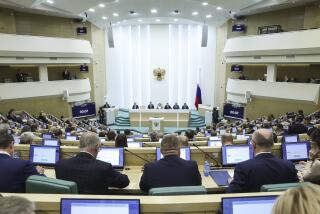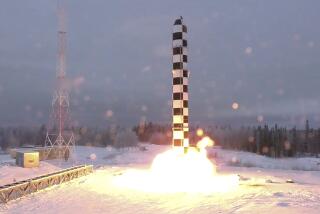An Option That’s Too Expensive : High political cost for U.S. if nuclear tests are resumed
- Share via
Beset by conflicting advice and personally committed to achieving a comprehensive ban on nuclear testing by the end of this decade, President Clinton will have to decide soon whether to approve a limited resumption of underground weapons tests, which have been suspended since last September. He has the option of approving up to 15 tests--three of them, under a cooperative arrangement, carried out by Britain--at the Yucca Flats test site in Nevada over the next three years.
There is no consensus within the Administration about what course to take. John Gibbons, the White House science adviser, opposes new testing. So do Energy Secretary Hazel O’Leary and officials of the Arms Control and Disarmament Agency. The Joint Chiefs of Staff and the main nuclear weapons design laboratories in Livermore, Calif., and Los Alamos, N.M., favor more testing. So does the State Department. In Congress, where the moratorium originated last year, 23 senators have urged its continuance. The law that created the moratorium says that testing can’t resume until 90 days after the President has submitted a report to Congress on his nuclear policy. A compromise plan would reportedly have the President approve nine tests over the next three years, to be followed by a permanent halt unless another country began testing.
Opponents of testing aren’t worried about radioactive fallout--underground tests have been quite clean in that regard--but about political fallout if the United States and Britain again begin setting off explosions.
Coincidentally or not, the world’s other major nuclear powers--Russia, China and France--are in a non-testing phase. Russia, whose last nuclear test was in October, 1990, no longer has access to its traditional testing grounds in the now independent country of Kazakhstan. But China is believed to be preparing for another large test, while France, which wants to proceed with the modernization of its nuclear arsenal, might also be eager to see the U.S. moratorium end. A continuation of the moratorium wouldn’t guarantee similar restraint in these countries, but renewed U.S. testing would pretty clearly serve to erode that restraint.
Are there compelling safety or reliability reasons for carrying out new tests? At this point it’s not even certain that one of the warheads to be tested--a redesigned W-80 for air-launched cruise missiles--would even be deployed by the Air Force. Nor is there a consensus that reliability tests on the Navy’s Trident missiles require detonating warheads; alternative, non-nuclear methods of testing for reliability are available.
The United States should not be the first nuclear power to break the testing moratorium, especially given this country’s leadership in trying to prevent the spread of nuclear weapons. The Non-Proliferation Treaty expires in 1995. A conference to extend it will be held, and concurrently a major push to negotiate a comprehensive test ban treaty will be made. If it resumes underground testing, even on a limited scale, the United States will engage in that effort from a greatly weakened political position.
Further nuclear testing is not a necessity. It’s an expensive option that the President, who probably could count on the support of most of Congress, would be on firm ground in choosing to reject.
More to Read
Get the L.A. Times Politics newsletter
Deeply reported insights into legislation, politics and policy from Sacramento, Washington and beyond. In your inbox twice per week.
You may occasionally receive promotional content from the Los Angeles Times.










